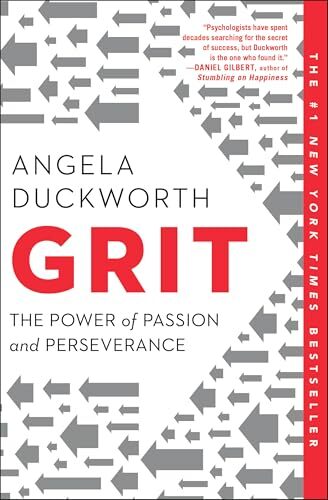
An interesting read on the importance of “grit”—a combination of passion and perseverance—to success in life. According to the book, your “grit score” does a better job than most other talent markers in predicting West Point graduation rates, school graduation rates, the performance of sales teams, and so on. In other words, while talent certainly matters, effort, hard work, and resiliency matter even more.
Many people react to this by saying, well, duh, “obviously” hard work matters, but the reality is most people don’t behave as if they really believe that. Most people, when they see success, assume it’s mostly due to innate talent: the star athlete was born with the ability to perform remarkable feats; the brilliant writer was a genius from the time they were a child; that programmer was writing code in the womb; and so on.
To me, the biggest benefit of this book is that it captures reasonably convincing scientific evidence that (1) grit is a better predictor of success than most talent markers—”As much as talent counts, effort counts twice”—and (2) you can become more gritty over time. Point #2 was especially interesting to me. The book talks about:
IQ can change
The book presents evidence that your IQ and brain structure change over the course of your life.
Learned industriousness vs learned helplessness
Each of these has a self-reinforcing loop:
- Learned industriousness. You put in some hard work, see some success, which motivates you to put in more effort, which produces more success, and so on.
- Learned helplessness. You put in some hard work, fail completely, become demotivated, put in less effort next time, fail again as a result, and so on until you make no more effort.
Do hard things regularly
One way to increase grittiness is to do some “hard” task on a consistent basis and to make it harder and harder over time.
- Weight lifting: add a little weight to the barbell each workout.
- Play the violin: take on harder and harder music each time.
- Running or swimming: run a little further or faster each time
Rhe exact task you focus on doesn’t matter: as long as you keep pushing yourself harder and harder, the grit you develop at one set of tasks will carry over to other tasks. So the key question to ask yourself is:
What hard thing do you do on a regular basis?
This idea resonates with me quite a bit. About 10 years ago, I started “training” at the gym, as opposed to just “working out.” I kept making my workouts harder and harder and developed a certain mental toughness to get through them. I then found I was using that same mental toughness—even the same “self speak” I use to push myself—in other tasks. I started procrastinating less. I started doing more interesting (and harder) things at work. My career started to take off. Learning to work out hard taught me to work hard in general.
Join gritty teams
Another way to improve your grittiness is to join gritty teams. You often see this with sports teams and military groups, where you get a cycle of:
- You see someone working hard
- You feel more motivated and work harder yourself
- Someone else sees you’re working hard
- They become more motivated and start working harder
- And so on
Overall
The book is not without flaws:
- It’s probably a little too gung ho on the power of grit, and doesn’t give enough credit to environment factors, random chance, good decision-making, and so on. Here’s an interesting critique of the science behind this book.
- Parts of the book are a bit boring, descending into overly simplified “here’s how to become successful” suggestions that are common to business books and TED talks.
Despite that, it’s still a worthwhile read.
